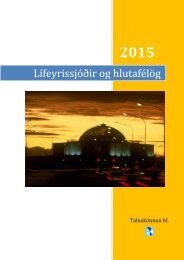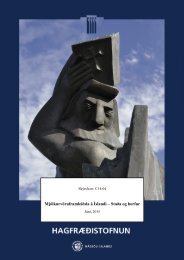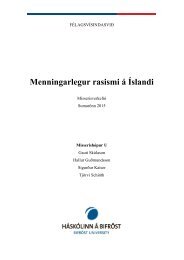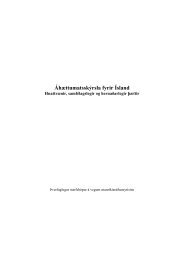You also want an ePaper? Increase the reach of your titles
YUMPU automatically turns print PDFs into web optimized ePapers that Google loves.
WORLD REPORT 2016<br />
HUMAN RIGHTS WATCH<br />
Canada<br />
Canada’s global reputation as a defender of human rights was tarnished by the<br />
failure of the Stephen Harper government, in power until October, to take essential<br />
steps to remedy serious human rights problems. Particular areas of concern<br />
include the rights of indigenous peoples, the legal status of sex work, restrictive<br />
counterterrorism measures, the impact of Canada’s extractive and garment industries<br />
abroad, and the rights of asylum seekers and migrants.<br />
Violence against Indigenous Women and Girls<br />
Growing public concern over missing and murdered indigenous women and girls<br />
has led to numerous calls from provincial leaders, opposition political parties,<br />
civil society, and in 2015, two United Nations committees, for a national inquiry<br />
into the violence.<br />
The UN Committee on the Elimination of Discrimination against Women concluded<br />
that Canada had committed a “grave violation” of the rights of indigenous<br />
women by failing to promptly and thoroughly investigate the high levels of<br />
violence they suffer. The committee also called attention to their mistreatment<br />
by the police, an issue that Human Rights Watch documented in its 2013 report<br />
Those Who Take Us Away.<br />
The UN Human Rights Committee expressed similar concern over the violence<br />
facing indigenous women and girls, as well as Canada’s failure to provide adequate<br />
and effective responses. Both UN committees recommended that Canada<br />
conduct a national inquiry to address the issue, a recommendation the Harper<br />
government rejected but which the newly elected Liberal government of Justin<br />
Trudeau has pledged to implement.<br />
In October 2015, eight police officers of the Sûreté du Québec (Quebec Provincial<br />
Police) faced suspension over allegations of abuse of indigenous women in the<br />
mining city of Val-d’Or. At time of writing, the province had no plans for an independent<br />
civilian investigation of the allegations, but had appointed a civilian auditor<br />
to oversee an investigation by the Montreal police, a separate municipal<br />
organization.<br />
Rights of Indigenous Peoples<br />
During the 19th and 20th century, approximately 150,000 indigenous children<br />
were removed from their families and communities and placed in residential<br />
schools, where they were forbidden to speak their own languages or practice<br />
their culture. Many also suffered physical and sexual abuse.<br />
In 2015, the Truth and Reconciliation Commission, mandated to provide former<br />
students and others affected by residential schools with an opportunity to share<br />
their experiences, found that the Canadian government pursued a policy of “cultural<br />
genocide” using residential schooling as a central element. According to<br />
the commission, the government’s goal was to divest itself of its legal and financial<br />
obligations to indigenous peoples and to gain control over their land and resources.<br />
The commission made a number of recommendations to uphold indigenous peoples’<br />
rights and to promote reconciliation. The UN Human Rights Committee subsequently<br />
endorsed the recommendations in 2015, but the Harper government<br />
did not accept them.<br />
Indigenous groups have criticized Canada for failing to respect land agreements<br />
with indigenous communities or to consult adequately with them, including with<br />
regard to resource extraction plans on traditional lands. The government has yet<br />
to pay adequate attention to severe poverty, housing, water, sanitation, healthcare,<br />
and education problems in indigenous communities, particularly those in<br />
remote and rural areas. Inadequate access to clean, safe drinking water continues<br />
to pose a major public health concern in a number of indigenous communities.<br />
Sex Work<br />
Following the 2013 ruling by the Supreme Court of Canada striking down previous<br />
restrictions that the court deemed violated the rights and security of sex<br />
workers, the parliament in December 2014 passed the Protection of Communities<br />
and Exploited Persons Act, which criminalizes communicating for the purposes<br />
of selling sexual services in public, or buying, advertising, or benefitting<br />
from the sale of sexual services. As sex workers, researchers, and human rights<br />
groups outlined in testimony before parliament, the act severely limits sex workers’<br />
abilities to take life-saving measures, such as screening clients. Criminaliz-<br />
158<br />
159










